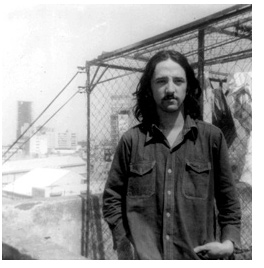
Having read Bolaño's 2666 prior to this, I am perhaps more apt to "get" the Savage Detectives. One of the biggest complaints is that this novel does not have a plot (or one that gets tied together). Following the journal of a young poet through the sex and literary references of his friendship with two anti-hero poets, the visceral realists, the individual narrative suddenly comes to a screeching halt as the characters escape into the Sonoro desert in search of an older poet, and to escape the murderous revenge of a pimp. Then twenty years pass, told only in monologues from people around the world who met the poets afterward, and their decline into the entropic nothingness of modernity (though personally I was expecting at least a hundred more narrators for the story to really get interesting). Eventually one realizes that the poets are fleeing some horrible crime, and that all the narratives are essentially interviews with someone looking for them. The beauty of this narrative move is that the point is not "what happens," but the effect of time and desire/desperation on our sense of reality, particularly through the use of choral narratives that everyone's got their own (flawed and limited) perspective. This is a move similar to in 2666, where no one character is the story's central protagonist, but we have an end date hundreds of years in the future that acts as a sort of existential crossroads for the present, casting the long shadow called history back onto events that, for the characters living them, are relatively important but soon fade into the otherworldly insignificance of the desert. As Bolaño himself suggests, this is a threnody, a death song for those still living. On the other hand, this story can be read as a comment on the discourse of the "other," that two Mexicans lost in the rest of the world is a parallel of the "noble savage" myths that accompanied the colonization of the new world. The visceral realist poets are so foreign that everyone whom they encounter become alien to themselves, and through the lack of closure, we the reader become equally as displaced from our own lives and sense of history. Despite all the literature and culture we acquire, Bolaño seems to suggest that on the most visceral level of reality we are all still savages, unsure what we are looking for and just as likely to kill the object of our desire when we find it.


No comments:
Post a Comment